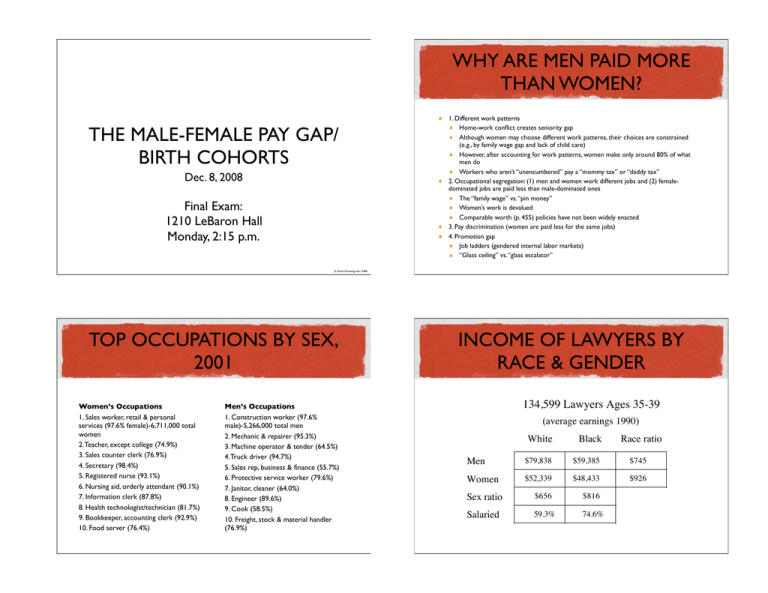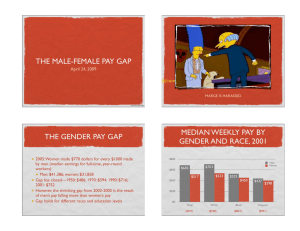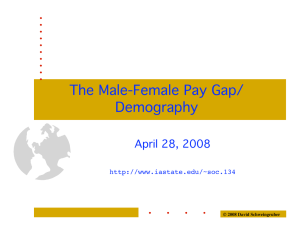WHY ARE MEN PAID MORE THAN WOMEN? THE MALE-FEMALE PAY GAP/
advertisement

WHY ARE MEN PAID MORE THAN WOMEN? THE MALE-FEMALE PAY GAP/ BIRTH COHORTS Dec. 8, 2008 Final Exam: 1210 LeBaron Hall Monday, 2:15 p.m. 1. Different work patterns Home-work conflict creates seniority gap Although women may choose different work patterns, their choices are constrained (e.g., by family wage gap and lack of child care) However, after accounting for work patterns, women make only around 80% of what men do Workers who aren’t “unencumbered” pay a “mommy tax” or “daddy tax” 2. Occupational segregation: (1) men and women work different jobs and (2) femaledominated jobs are paid less than male-dominated ones The “family wage” vs. “pin money” Women’s work is devalued Comparable worth (p. 455) policies have not been widely enacted 3. Pay discrimination (women are paid less for the same jobs) 4. Promotion gap Job ladders (gendered internal labor markets) “Glass ceiling” vs. “glass escalator” © David Schweingruber 2008 TOP OCCUPATIONS BY SEX, 2001 Women’s Occupations 1. Sales worker, retail & personal services (97.6% female)-6,711,000 total women 2. Teacher, except college (74.9%) 3. Sales counter clerk (76.9%) 4. Secretary (98.4%) 5. Registered nurse (93.1%) 6. Nursing aid, orderly attendant (90.1%) 7. Information clerk (87.8%) 8. Health technologist/technician (81.7%) 9. Bookkeeper, accounting clerk (92.9%) 10. Food server (76.4%) Men’s Occupations 1. Construction worker (97.6% male)-5,266,000 total men 2. Mechanic & repairer (95.3%) 3. Machine operator & tender (64.5%) 4. Truck driver (94.7%) 5. Sales rep, business & finance (55.7%) 6. Protective service worker (79.6%) 7. Janitor, cleaner (64.0%) 8. Engineer (89.6%) 9. Cook (58.5%) 10. Freight, stock & material handler (76.9%) INCOME OF LAWYERS BY RACE & GENDER 134,599 Lawyers Ages 35-39 (average earnings 1990) White Black Race ratio Men $79,838 $59,385 $745 Women $52,339 $48,433 $926 Sex ratio $656 $816 Salaried 59.3% 74.6% FEMALE PAY PER $1,000 PAY OF MEN, 1995 Physicians! ! ! ! $649 Production inspectors!$649 Financial managers!! $674 Insurance adjusters! $691 Retail sales!! ! ! $693 Education admin.! ! $708 Accountants! ! ! $734 College faculty!! ! $781 Public administrators! $786 Chefs & cooks!! ! $885 High school teachers! $881 Engineers! ! ! ! $862 Computer analysts!! $860 Journalists! ! ! ! $855 Janitors & cleaners!! $844 Waiters & waitresses! $822 Lawyers!! ! ! ! $818 Health technicians!! $813 INTERNAL LABOR MARKETS Store manager (3.1% female) Produce dept. manager (4.7% female) Grocery dept. manager (7.6% female) Internal labor market for a grocery store chain, 1981-84 Asst. grocery dept. manager (16.8% female) Produce dept. Grocery dept. Baker/deli dept. General merchandise dept Clerk (19.1% female) Clerk (49.9% female) Manager (clerk position) (93.7% female) Dept. head (clerk position) (91.8% female) Courtesy clerk (sex integrated) BASIC DEMOGRAPHIC TERMS Demography: the study of human population Demographer: sociologist who studies trends in population characteristics Three major components Fertility: the incidence of childbearing in a country’s population Mortality: the incidence of death in a country’s population Migration: the movement of people into and out of a specified territory BIRTH COHORTS Birth cohort: set of people who were born during the same era and who face similar societal circumstances brought about by their shared position in the overall age structure of the population (p. 406) Birth cohorts effect everyday lives in two ways: Cohort effect: phenomenon in which members of a birth cohort tend to experience a particular life event or rite of passage—puberty, marriage, childbearing, graduation, entry into the workforce, death—at roughly the same time (p. 407) Period effect: phenomenon in which a historical event or major social trend contributes to the unique shape and outlook of a birth cohort (p. 407) HOMER’S MOTHER AND JOE NAMATH








